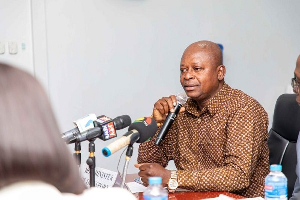The J.H. Vrs The People case as reported by the Ghanaian Times
The Supreme Court has unanimously decided that every nominee of the President for ministerial appointment, whether retained or new, requires prior approval of parliament. The court was giving its judgement yesterday in the case in which Mr. J.H. Mensah (plaintiff), the Minority Leader in Parliament , challenged the constitutional status of retained Ministers in the second government of the fourth republic.
The five -member panel presided over by Mr. Justice G.E.K. Aikins , ruled that prior approval was not a term of art or a fixed procedure. The court, by a 4-1 majority, with Mr. Justice Aikins dissenting, also did not accede to the relief sought by Mr. Mensah that a necessary incident of prior approval constituted "consideration and vetting"
Consequently, it rejected the plaintiffs contention that "whoever has not been so approved and appointed cannot lawfully act and hold himself out as a minister or Deputy Minister of State "
Again the court held by another 4-1 majority decision that upon the true and proper interpretation of certain provisions of the constitution, "no person can in each Parliament of the Fourth Republic after a reasonable time from that parliament's inauguration act as a Minister or Deputy Minister of State without the prior approval of Parliament"
The judges in the majority were Mr. Justice George Acquah, Mr. Justice C.F. Hayfron Benjamin, Mr. Justice A.K.B. Ampiah , and Miss Justice Sophia Akuffu,. Mr. Justice Acquah, who delivered the majority lead judgement, said the meaning of "prior approval" had not been defined anywhere in the 1992 Constitution. He said if the standing Orders adopted by parliament to approve the Ministers and their Deputies did not infringe on the 1992 Constitution, that action could not be deemed to be unlawful. Mr. Justice Acquah referred to the debates of the Consultative Assembly which plaintiff relied heavily upon and said expressions like screening "assessing" and "scrutiny" were used in addition to 'vetting".
He . however, rejected the argument of the Attorney General that the Supreme Court had no power to enquire into the business of Parliament saying, that the court had powers under the article 130(!) to decide on al matters relating to the interpretation of the Constitution.
Mr. Justice Acquah said the 1992 Constitution also empowered every Ghanaian who alleged that its provisions were being breached , to come to court. He questioned the grounds on which By the plaintiff sued the Attorney General, represented at the hearing by Dr. Obed Asamoah and his Deputy, since they had then not received prior approval by Parliament .
Giving his dissenting opinion , Mr. justice Aikins said it was untenable for Ministers of State and their deputies to continue in office without prior approval by the current Parliament. He said the Ministers of State and their Deputies had no independent existence and their tenure of office should end with the President every four years. Mr. Justice Aikins favoured the plaintiff contention that the term "prior approval" meant "assessing"," security" and "vetting" in ensuring that whenever was being approved met required standard .
He rejected the view shared by the Attorney - General that deciding on matters raised in Parliament itself constituted a "political question", saying the interpretation of the Constitution should determine that issue" For his part, Mr. Justice Hayfron Benjamin said reasonable time must be allowed after general elections to enable new institutions to be set up to avoid absurdity. He said during the interval, Ministers of State and their Deputies might hold over their respective offices .
Mr. Justice Ampiah, who also disagreed with the plaintiff said what should constitute "reasonable time" during which fresh appointments could be made, should be determined by Parliament itself. On the meaning of "prior approval", Mr. Justice Ampiah said it should be what Parliament found "acceptable " and that ordinary words should be interpreted in an ordinary words should be interpreted in an ordinary sense. Supporting the majority view
Miss Akuffo agreed that "prior approval" should relate to both old and new ministers and that it should not be a term of art.
General News of Friday, 30 May 1997
Source: --












